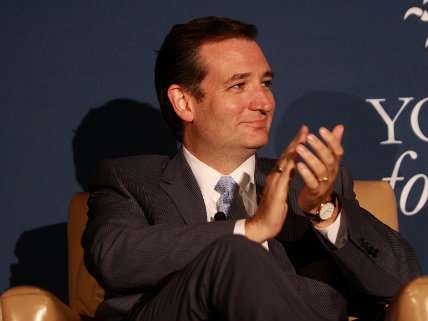Ted Cruz and John Kasich Are Teaming Up to Try to Stop Donald Trump at a Contested Convention
Two late night press releases reveal the unusual state of the GOP primary race.

The unusual state of the Republican presidential race was made exceedingly clear late last night in two press releases, issued just minutes apart, from two of the three remaining contenders in the GOP primary, Texas Sen. Ted Cruz and Ohio Gov. John Kasich. For all practical purposes, both campaigns are now working in tandem to stop frontrunner Donald Trump from winning an outright majority of delegates prior to the party convention in July.
Cruz's campaign released a statement declaring that Trump would be bad for the GOP's short-term electoral odds and worse for its long-term chances, and that as a result, Cruz would essentially cede the states of Oregon and New Mexico to Kasich:
Having Donald Trump at the top of the ticket in November would be a sure disaster for Republicans. Not only would Trump get blown out by Clinton or Sanders, but having him as our nominee would set the party back a generation. To ensure that we nominate a Republican who can unify the Republican Party and win in November, our campaign will focus its time and resources in Indiana and in turn clear the path for Gov. Kasich to compete in Oregon and New Mexico, and we would hope that allies of both campaigns would follow our lead.
Although the announcement did not say so explicitly, the message was clear: His campaign understands that there is now no remaining chance to secure the GOP nomination prior by winning a majority of delegates prior to the convention in July. So Cruz's aim at this point is to stop Trump from achieving a delegate majority by clearing a path for Kasich in the states where he is stronger.
For weeks, Cruz adamantly insisted that a contested convention was not acceptable, and that he would win the nomination outright. But what his release last night makes clear is that he is now openly trying to cause a contested convention.
Kasich was even clearer on this point. In a statement released at almost the exact same time as Cruz's, he signaled he would step aside for the Texas senator to win in Indiana in order to keep Trump from winning the nomination outright.
Our goal is to have an open convention in Cleveland, where we are confident a candidate capable of uniting the Party and winning in November will emerge as the nominee. We believe that will be John Kasich, who is the only candidate who can defeat Secretary Clinton and preserve our GOP majority in the Congress.
Due to the fact that the Indiana primary is winner-take-all statewide and by congressional district, keeping Trump from winning a plurality in Indiana is critical to keeping him under 1237 bound delegates before Cleveland. We are very comfortable with our delegate position in Indiana already, and given the current dynamics of the primary there, we will shift our campaign's resources West and give the Cruz campaign a clear path in Indiana.
In turn, we will focus our time and resources in New Mexico and Oregon, both areas that are structurally similar to the Northeast politically, where Gov. Kasich is performing well. We would expect independent third-party groups to do the same and honor the commitments made by the Cruz and Kasich campaigns.
Kasich has downplayed the significance of the moves, saying that he still wants Indiana voters to vote for him, it's mostly about directing resources. But even still, the statements represent a somewhat remarkable joint effort between the two campaigns, and highlight both the strange state of the overall race and the serious tensions within the Republican party. Trump, of course, has complained that the two campaigns are "colluding" against him.
The statements are notable not only because they suggest that the Cruz and Kasich campaigns are joining forces to stop Trump, but because they are effectively open calls for their independent backers, such as Super PACs, to do the same.
Just as notably, they are also asking voters in the GOP primary to cast their votes strategically. The message here that both campaigns are sending to voters in Indiana, Oregon, and New Mexico is not to vote for the candidate they prefer, but to vote for a contested convention, the outcome of which will be decided by delegates. Both the Cruz and Kasich campaigns have pitched themselves as alternatives to Trump who are well-positioned to win in a multiple-ballot, open convention situation, so there's obviously a strong element of self-interest for both campaigns. And yet the message here is, in some sense, that voters should worry less about picking a winner and more about casting their votes for whichever candidate will be most effective at stopping Donald Trump.
Update: Is Kasich backing out of the deal? Speaking about Indiana voters today, he said, "I've never told them not to vote for me, they ought to vote for me. But I'm not over there campaigning and spending resources, we have limited resources." His statement last night, however, said explicitly that it would "give the Cruz campaign a clear path in Indiana."


Show Comments (96)